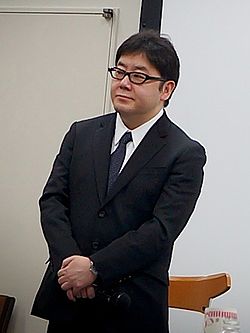Japanorama
2002 British TV series or programme From Wikipedia, the free encyclopedia
Japanorama is a series of documentaries presented by Jonathan Ross, exploring various facets of popular culture and trends of modern-day Japan.
| Japanorama | |
|---|---|
 Title card of Japanorama | |
| Created by | Hotsauce TV |
| Written by | Jack Barth |
| Directed by | Peter Boyd Maclean |
| Starring | Jonathan Ross |
| Country of origin | United Kingdom |
| No. of series | 3 |
| No. of episodes | 18 |
| Production | |
| Running time | 30 minutes |
| Original release | |
| Network | BBC Choice BBC Three UKTV |
| Release | 9 June 2002 – 23 April 2007 |
Each episode has a theme, around which Ross presents cultural phenomenon, films, music, and art that exemplify facets of Japan. The series is colourful in both its creative use of subject matter, and its use of bright colours that helped accent the action on screen rather than distract from it. Subjects are separated by eye catches that often featured the artwork of Junko Mizuno. Ross hosts each episode in bright, eye-catching suits.
Fans have praised the series for the care that both Ross and the BBC have placed in its production. Time was given to delve into each subject, and he was able to interview various figureheads of culture and industry, including Mamoru Oshii, Hayao Miyazaki, Takeshi Kitano, Takashi Miike, Takashi Murakami, and Sonny Chiba.
The theme song of the show was Kiyoshi no zundoko bushi by Kiyoshi Hikawa.
Series and episode list
Summarize
Perspective
Japanorama consisted of three series, each with six episodes. The first series was shown on BBC Choice in 2002, while series 2 and 3 were shown on BBC Three in 2006[1] and 2007 respectively.[citation needed]
Series 1
| Title | Episode | First aired | |
|---|---|---|---|
| Science Fiction | 1 | 9 June 2002 | |
| Segments include: |
 TV: Ultraman and interview with director Kazuho Mitsuta | ||
| Youth | 2 | 16 June 2002 | |
| Segments include: |
 Film: Waterboys (2001), a high school comedy film about five boys who start a synchronized swimming team. | ||
| Sex | 3 | 23 June 2002 | |
| Segments include: |
Film: Warm Water Under a Red Bridge (2001), a Shōhei Imamura last feature film. | ||
| Crime | 4 | 30 June 2002 | |
| Segments include: |
 Film: Tokyo Drifter (1966) | ||
| Swords | 5 | 6 July 2002 | |
| Segments include: |
 Manga: Lone Wolf and Cub, Interview with writer Kazuo Koike | ||
| Horror | 6 | 13 July 2002 | |
| Segments include: |
Interview: Architects and Godzilla actors | ||
Series 2
| Title | Episode | First aired | |
|---|---|---|---|
| Kakkoii (Cool) | 1 | 7 September 2006 | |
| Segments include: |
 Architecture: Buildings in Omotesandō, Tokyo. | ||
| Otaku (Nerd Culture) | 2 | 14 September 2006 | |
| Segments include: |
 Culture: Akihabara | ||
| Zoku (Tribes) | 3 | 21 September 2006 | |
| Segments include: |
 Culture: Harajuku, Tokyo and the subcultures who go there to show off – Gothic Lolitas, gyaru, rockabillys and the like. | ||
| Owarai (Comedy) | 4 | 28 September 2006 | |
| Segments include: |
Culture: Manzai, stand-up comedy | ||
| Bushido (Samurai Spirit) | 5 | 5 October 2006 | |
| Segments include: |
 Culture: Beetle sumo | ||
| Kawaii (Cute) | 6 | 12 October 2006 | |
| Segments include: |
Culture: Hello Kitty. | ||
Series 3
| Title | Episode | First aired | |
|---|---|---|---|
| Gaijin (Outsiders) | 1 | 19 March 2007 | |
| Segments include: |
 Culture: Bosozoku (bikers) | ||
| Ai and Koi (Love and Romance) | 2 | 26 March 2007 | |
| Segments include: |
Religion: Shinto shrines with fertility rites and penis festivals. | ||
| J-Art (Japanese Pop Art) | 3 | 2 April 2007 | |
| Segments include: |
Culture: Takashi Murakami's "Superflat" style of subversive characters derived from Manga and Anime, turned into merchandise | ||
| Densetsu (Legends) | 4 | 9 April 2007 | |
| Segments include: |
 29 October 2005 TV: 40 years of Ultraman, and the "Ukulele Ultraman" pop video | ||
| Kaidan (Scary Stories) | 5 | 16 April 2007 | |
| Segments include: |
Culture: kimodameshi (scary walks for children) | ||
| Gyaru (Bad girls) | 6 | 23 April 2007 | |
| Segments include: |
Culture: Kogals, Ganguro and Yamanba girls. | ||
See also
- Japan TV, a similar programme by BBC Choice, broadcast in August 2000 and June 2001
- Adam and Joe Go Tokyo, an eight-part 2003 series examining life in Tokyo, produced by Jonathan Ross
- Asian Invasion, a 2006 mini-series with Jonathan Ross talking about the cinema of Japan, Hong Kong and Korea
Notes
- from album Deep River, T.W.O, 4th Ikimashoi! and GRADUATION, respectively.
- the Remake version of Resident Evil was not released in Europe (including United Kingdom where Japanorama was originally aired) until Friday the 13th of September 2002.
- released as a launch title for Xbox in Europe, alongside Halo: Combat Evolved.
- Since its release, Battle Royale has had an influence on The Hunger Games trilogy, and many battle royale video games. as well as parody, such as Tokyo 10+01 and Mecha-Mecha Iketeru! Mecha-Ike Owarai Battle Royale.
- including Ring (1998), Ring 2 (1999) and Ring 0: Birthday (2000).
References
External links
Wikiwand - on
Seamless Wikipedia browsing. On steroids.
